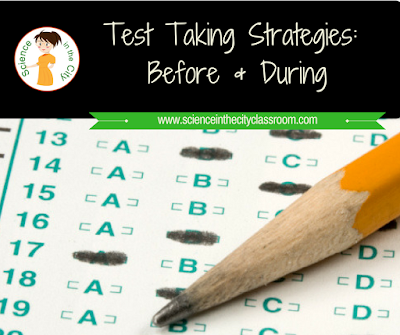Tests!!! (And how to make them better)
If, like my classes, you have been inundated with tests lately, it may be the last thing you want to discuss or read more about. However, I'm not talking about APPR and pre-assessments or post-assessments. I'm talking about strategies you and your students can use to help them before, or during the tests that you care about (chapter tests, or end of the year tests in your subject area). |
| Test image from "Long Before the Third Grade Test" (CC BY 2.0) by wecometolearn |
My students struggle with reading and understanding the questions, and often get frustrated and just guess, or give up during a test. This is a habit that I work very hard to help them overcome during the course of the year.
Strategies Before the Test:
Build up their confidence. Not to over inflate it, but to make them comfortable with their own knowledge and to make them comfortable with test question formats and the types of questions that are asked. Some of the ways that I do this are:- Review games based on test questions,
- Review questions in partners, and/or stations, and check their answers, that are very similar to the test questions. Then when the see the test questions they look familiar. This can also be a good place to use task cards. See here for 5 ways to engage and assess using task cards
- Build up other vocabulary, besides content vocabulary, that they are likely to see on the test (words like compare, abundant, etc). I do this through various vocabulary strategies
- Have them work to create test questions and quiz a partner (a great closure or ticket out activity) -- predict what will be on a test from today's work.
Strategies During the Test:
There are all the common strategies (cross out wrong answers, do the ones you know first, underline key words, but here are a few others that I have found to be helpful to my students.Cover up the answer choices and predict the correct answer. This is something that good students do instinctively but weaker students don't seem to do. I teach this strategy, we practice it, and then go around and give bonus points (I stamp their test) if I see them using this strategy. I give them scrap paper and have the cover the choices, and then write down what they think the answer will be, before looking at the choices. It really helps them not get thrown off by the distractors.
Split the test into two parts and one part they can work with a partner. You, or they, can choose partners. Sometimes I literally make this into a two part test. Sometimes I let them work for most of the period, then use the last 10 -20 min or so to check with a partner on the ones they are having trouble with, or to compare their answers and decide on final answers to turn in. I don't do it right away in the beginning of the year, but once routines are established this is a great way to help students really think through the questions, explain their thinking, and choose the best answer. You might be very impressed at the conversations that you hear!!
What other strategies do you use to help students work through tests that are difficult? Please leave your strategies in the comments.
So often tests don't truly test the content, but test their reading!
 |
Test image from |




